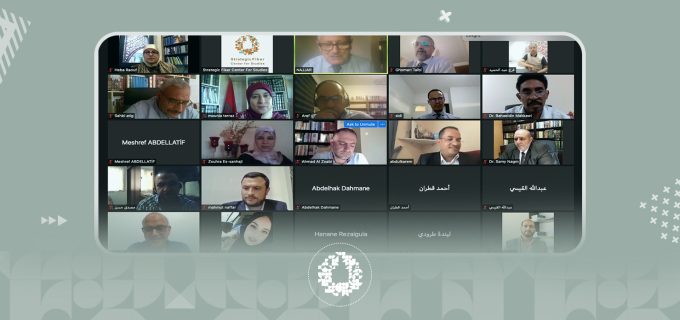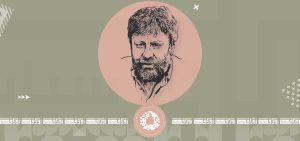On Wednesday, October 6, 2021, the Center for Strategic Thought for Studies held a meeting between the Chairman of the Scientific Committee in the Encyclopedia of Islamic Political Jurisprudence, Professor Abdul Majeed Al-Najjar and its four members, and between the recently selected researchers, to learn about the work mechanism and communicate with the coordinators to complete scientific research. .
Professor Abdul Majeed Al-Najjar reviewed the importance of the encyclopedia project in light of the many problems experienced by the Arab and Islamic nation in general, and Islamic thought in particular, today, from many problems that made political jurisprudence among the most weak Islamic sciences, with a gap in the Islamic political library in terms of information and the availability of sources in a systematic way disciplined science.
Professor Al-Najjar stressed that the aim of the encyclopedia is to highlight and develop Islamic political science, adding: “Every day in our Arab and Islamic region we see many matters related to governance and the position of those who want to rule with an Islamic background in these problems.”
He pointed out that the research that will be submitted is of a special nature and is not sent, academic or even personal, but falls within a scientific encyclopedia, with a specific purpose, characterized by extreme accuracy and shortness, so that it is available not only to academics and specialists, but to anyone interested in fields of political work.
The head of the scientific committee in the project of the Encyclopedia of Islamic Political Jurisprudence stressed the importance of adhering to the limitations and controls set by the project organizers, the most important of which is the researcher’s guide, which requires a kind of flexibility and giving up what we sometimes want for the success of the project.
He stated that five basic axes were adopted in the encyclopedia project to carry out research according to it, which are: “the state and its functions”, the second: “public opinion and civil society”, the third: “established political concepts”, and the fourth: “the government and its powers”, and the last is: Opposition, Relations and International Laws.
In turn, Professor Tibi Ghamari, Head of the Foundation’s Political Concepts Center, confirmed that the researchers who were selected to work on the encyclopedia project have a distinct diversity of knowledge experiences, and disparities in writing and editing experiences, in addition to ideological convictions, whether in the research group or even the scientific committee.
Professor Ghamri added: “The peculiarities of diversity and benefits contradict the specificity of encyclopedic research, which is characterized by consistency, unity and convergence. Therefore, we are faced with a very important bet, represented in how to unify these various peculiarities for researchers so that they lead to the achievement of a consistent and unified text in an almost convergent manner.”
He continued: “To overcome this conflict between the privacy of researchers and the peculiarities of encyclopedic research characterized by unity, we – the scientific committee and researchers – are committed to professionalism in dealing with all encyclopedia research, and to abide by the unified guide of the encyclopedia, and we give up all the privacy of every researcher.”
An official of the axis of political concepts established called on researchers to be objective, which requires abandoning personal opinions and a commitment to originality and creativity, explaining that “professionalism is a necessary issue for a coherent text, because we are talking about a huge number of entrances, and this requires us to complete consistent texts.” .
On the same subject, Dr. Ahmed Al-Zoubi, the official in charge of the axis of the state and its functions, said: “Our main task is to consult and coordinate in order to reach the best formula for this encyclopedia, and to fill the gap in Islamic political thought.”
He called for taking into account the existence of a unified format in the curriculum and the subject among researchers, and strict adherence to what was stated in the researcher’s guide to the encyclopedia project, in addition to showing research and academic rigor, and adherence to methodological and formal specifications.
Dr. Al-Zoubi continued: “If we can go back to the first editions of the sources and references, this gives an additional value to the encyclopedia, and then the methodology of the research, and the issue of completing the research on the basis of totality, totality and comprehensiveness, includes partial details and what is based on them, logical arrangement and historical and methodological sequence, As well as avoiding difficult language, and adopting an easy and disciplined language.
On the other hand, Dr. Heba Raouf Ezzat, responsible for the axis of opposition and international relations and laws, noted the importance of having a set of key words in the topic of research, the most prominent of which is intention, as there must be sincerity in a huge encyclopedic work that will have its aftermath, and its impact will be wide in many circles, Not only in experts and scientists, but also in young people who have questions and want answers.
The second matter lies in the researcher’s guide, honesty and integrity, taking into account the importance of science and expansion in other angles for researchers when writing about a new research, adding: “It is important to refer to master’s and doctoral theses, and they have become available in our Arab region on the database, and this It will make it easier for the researcher to access information and its sources, as well as to cooperate objectively and review a number of concepts to serve the researcher and his subject.
On the same subject, Dr. Ahmed Qatran, the official in charge of the axis of public opinion and civil society, pointed out the importance of the issue of the relationship between the scientific committee and researchers, as the encyclopedia will serve as the home of all researchers and supervisory committees.
Dr. Katran added: “The researcher must have direct contact with the coordinator, and the researcher’s relationship with the scientific committee is a cooperative, complementary, interactive and quick-response one, because the two teams are concerned with achieving the heart of the encyclopedia, which is the scientific heart.”
At the conclusion of the meeting, which was characterized by interaction and participation in terms of questions and inquiries that took place between the head of the scientific committee of the project of the Encyclopedia of Islamic Political Jurisprudence and its members with participating researchers on many concepts that are supposed to start from according to the researcher’s guide, Professor Abdul Majeed Al-Najjar called to start writing research After selecting topics with its coordinators, pointing out at the same time that meetings are regularly renewed with researchers and committee members.
It is worth noting that the Strategic Fiker Center for Studies held, on Friday, October 1, 2021, the first meeting for researchers in the project of the Encyclopedia of Islamic Political Jurisprudence, in the presence of the head of the project’s advisory body, the center’s advisor, Professor Seif El-Din Abdel-Fattah, who aimed to introduce the project And its founding vision, and the methodologies adopted to work on the project.




